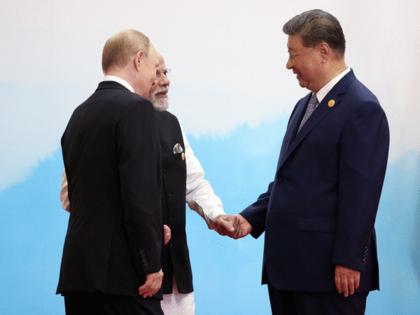China's Xi redraws geopolitical map with embrace of Putin, Modi
Published in News & Features
President Xi Jinping used a mix of bonhomie and economic allure this week to send Donald Trump a clear message: Beijing has too much global clout to be dictated by the U.S.
Cameras captured the Chinese leader in a rare, unscripted huddle on Monday with Vladimir Putin and Narendra Modi — his most powerful partners in resisting America on the world stage — at a summit in the Chinese port city of Tianjin. At one point, Xi held hands with his Indian counterpart, as the three men laughed casually, a striking scene given just months earlier New Delhi and Beijing were seen as rivals.
The images were a victory for Xi’s political project to build an alternative to the U.S.-led world order, in which America’s dollar dominance has given it global sway. Hours after the three men gathered at the Shanghai Cooperation Organization event, Beijing signed a major gas pipeline deal with Moscow — rebuking Trump’s efforts to use tariffs to prise India and China away from Russian energy purchases.
“China has developed and sequenced its messages perfectly, and the optics of Xi, Putin and Modi embracing each other are coming sharply into view,” said Josef Gregory Mahoney, a professor of international relations at Shanghai’s East China Normal University. “This week will be remembered as one in which the world shifted fundamentally.”
Since taking power in 2012, Xi has methodically built up blocs outside the orbit of Washington’s influence. While such groupings have often been dismissed as talking shops, Trump’s trade war is giving them new purpose.
Xi is dangling economic carrots to maximize cohesion. The SCO is being kitted out with a new development bank, he announced as the group held its largest summit since being founded in 2001, without revealing details on funding. Brazil’s Luiz Inacio Lula da Silva, meanwhile, plans to convene a snap virtual meeting of BRICS leaders Monday to discuss how to unite against Trump’s trade policy, Bloomberg reported.
Beijing will also showcase its might as a growing military power at a parade Wednesday set to be attended by leaders including North Korea’s Kim Jong Un and Putin, as China unveils new hypersonic weapons and combat drones. The Indian leader will not remain for that event.
While U.S. Treasury Secretary Scott Bessent dismissed the SCO summit, telling Fox News it was “largely performative,” to other observers Xi has pulled off a meaningful shift in the balance of diplomatic power.
“The SCO summit was a clear victory for China’s world view,” said Jeremy Chan, a senior analyst on the China and Northeast Asia team at Eurasia Group. “Merging the SCO with China’s celebration of the 80th anniversary of the end of WWII — not to mention Beijing’s airbrushed interpretation of the war — shows how much China’s talking points were adopted.”
The SCO’s embrace of Beijing’s position on global security issues shows Xi’s growing sway, he added, noting the group’s joint statement omitted any mention of Ukraine, while condemning attacks by the U.S. and Israel against Iran.
The SCO has traditionally been hampered by rivalries between members such as India and Pakistan, as well as its narrow security focus, which has offered little in the way of economic support. The organization has failed to provide meaningful help during crises, including recent attacks on Iran.
Similarly, talk of establishing a BRICS currency has failed to get off the ground and attracted the ire of Trump, who threatened tariffs if such a development got underway.
“This week is a diplomatic triumph for Beijing but China is still years or decades away from neutralizing U.S. power in global finance, security and technology,” said Neil Thomas, a fellow on Chinese Politics at Asia Society Policy Institute’s Center for China Analysis. Beijing “still can’t offer the type of security guarantees and open economic architectures provided by the United States.”
This year’s China-chaired activities addressed some concerns. Xi announced a streamlined structure, merging observer and dialogue partner categories into a single “partner” designation to potentially improve decision-making. More substantively, members agreed to establish an SCO Development Bank, a concept discussed for years but only now approved.
“China is using the bank as a mechanism to cohere a geopolitical grouping, as we’ve seen it do before with the New Development Bank for the BRICS,” said Christopher Beddor, deputy China research director at Gavekal Dragonomics, adding that it could prove to be substantive. “There’s no contradiction to view it as both a geopolitical tool and an institution that could deliver real benefits to people.”
Xi outlined other proposals to boost the economic support of members, including increased investments, loans to partners and grants to member states.
China also unveiled a decision this week to test visa-free entry for Russian citizens, rolling out a program to its “no limits” partner that had for months — and in some cases years — been available to an array of European and other nations.
While the Trump administration has touted Russia and China as natural enemies, the reality is that at a time of conflict with the U.S. they need each other, according to Alexander Gabuev, director of the Carnegie Russia Eurasia Center.
“Xi Jinping is in the driving seat,” he added. “And asymmetry where China can cherry pick what it wants in the partnership and set the conditions is very much on display.”
©2025 Bloomberg L.P. Visit bloomberg.com. Distributed by Tribune Content Agency, LLC.







Comments